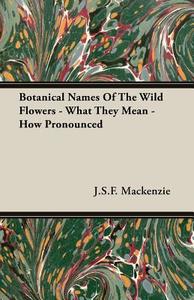
Botanical Names Of The Wild Flowers - What They Mean - How Pronounced
- Editore:
Buchanan Press
- EAN:
9781406725070
- ISBN:
1406725072
- Pagine:
- 228
- Formato:
- Paperback
- Lingua:
- Inglese
Descrizione Botanical Names Of The Wild Flowers - What They Mean - How Pronounced
Botanical Names of the Flowers What they mean. How Pronounced. By Colonel . S. F . Mackenzie or Wild Flowers and hov to name them at a glance, British Orchids how to tell one from another, etc. PREFACE MANY of us, no doubt, are prevented trying to learn the names of the Wild Flowers we see in our lanes and meadows because of the uncouth look of their botanical names. We are uncertain as to how these barbarous words ought to be pronounced we know not what their so-called scientific names mean. The Greek or Latin names given to Wild Flowers are not, in themselves, in any way scientific. These words were those in common everyday use by the Greeks or Latins when the flower first happened to be named. If Chrysanthemum were scientific, so also would Goldilocks be. Both have practically the same meaning. Chrysanthemum is a compound Greek word, chrys golden, anthos flower Goldilocks, a compound English word and the common name for the Wood Crowfoot, is nothing more than a translation of its second Latin botanical name auricomus, auri golden, comus hair or locks. But there is a very great advantage in using the botanical name. By so doing we are using a standardized name. By it every one all over the world knows exactly the plant referred to. It is otherwise if we use the Common English name. This often varies in different parts of the country. The plant botanically known as Galium Aparine has the popular English names of Goosegrass, Cleavers, or Catchweed. Some know it under one name, some under another. Once I have heard it called Scratch Tongue. On asking why such a name, I was told that boys were in the habit of putting out their tongue,, and scratching it with the leaf to see whose tongue would bleed most. On the other hand, the popular English names, in spite of the confusion which arises from the same plant being known by a different name in a different part of the country, are full of meaning, and much more interesting. Scratch Tongue, when you know how it came by its name, is much more likely to stick in your brain than Galium Aparine, even when you know what these Latin and Greek words mean. To Linneus, the great Swedish botanist, and founder of modern botany, belongs the honour and glory of having evolved a scientific plan for the naming of Wild Flowers. When Linneus lived born in 1707, died 1778 Latin was the universal language commonly used by writers of all countries. He therefore wrote in Latin, and gave to plants the Latin names by which they were known to the ancients. Linneus plan is as simple as it is efficient. To every plant he gave two names, and no two plants have exactly the same two names. The first or group name corresponds to the surname of human beings. All plants botanically alike, or, so to say, belonging to one and the same household, is given a group name. This group name is peculiar to, and only given to the members of the same household. Some groups have many members, some only one. According to Bentham and Hookers British Flora 6th Ed., Wild Flowers are divided into 501 groups. Although we have so many group names, no two have the same name. Several are somewhat alike, but yet are different. We have the same sort of thing with our surnames. Smith and Smythe are alike, but yet are different. The second Botanical Name corresponds to the Christian name of human beings, and like that, enables us to distinguish the different individuals of the same household. The same second botanical name can not be given to two members of the same group. But the same second botanical name is found in many different groups. Usually these second botanical names indicate some characteristic of the plant, as hirsutus hairy, latifolia broadleaved, c. or tell us where they are to be found, as arvensis a cultivated field, sylvestris a wood or shady place, c...


